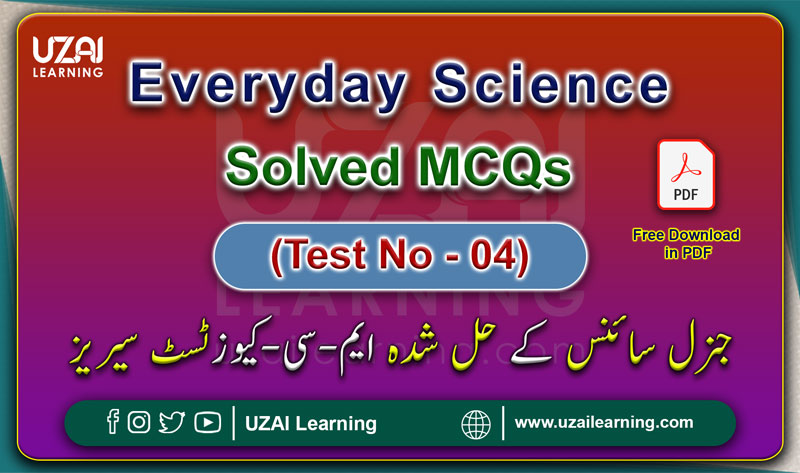
Everyday Science Solved MCQs
Everyday Science MCQs Test Series for all types of test preparation for example FIA, IB, FBR, ANF, ASF, NTS, PTS, OTS, CTS, FPSC, PPSC, KPPSC, BPSC, SPSC, and other government and private sector test organization. Candidates who have applied to above mentioned organization or else.
You can prepare yourself for written tests and interviews by reading books, mcqs and notes online or free Download all notes, books, and other preparation material for tests in PDF MCQs and Questions Answers Base Information for FIA, ASF, IB, FBR FPPSC, PPSC, KPPSC Test Preparation.
Here you can get all subjects MCQs Questions and Answers i.e. General Knowledge, Everyday Science, Pakistan Study, Islamic Study Current Affairs, Computer, Mathematics, Physics, English and other subjects Up-to-Date Syllabus for tests preparation of government and private organizations.
پی ڈی ایف میں ڈاونلوڈ کرنے کے لئے نیچے👇 دئیے گئے لنک پر کلک کریں۔
Everyday Science MCQs Part-04
61. Approximate age of moon is _?
A. 4.51 billion years
B. 4.55 billion years
C. 4.53 billion years ✔
D. 4.57 billion years
62. The vitamin Folate works together with __ to produce new red blood cells?
A. Vitamin D
B. Vitamin A
C. Vitamin B-12 ✔
D. None of the above
63. The Mirror used in the Automobiles are___________?
A. Concave
B. Convex ✔
C. Plains
D. Reflective
64. ‘Bar’ is the unit of___________?
A. Temperature
B. Heat
C. Atmospheric pressure ✔
D. Current
65. Why normal rain is slightly acidic?
A. due to presence of dust in air
B. carbon dioxide and water in clouds react to form carbonic acid ✔
C. Ozone depletion
D. All of these
66. The scientific study of insects is known as _?
A. Ichthyology
B. Entomology ✔
C. Zoology
D. Botany
67. The Temperature of the surface of Sun is_______?
A. 5,778 Kelvin ✔
B. 6,778 Kelvin
C. 7,778 Kelvin
D. 9,778 Kelvin
68. The Sun is at an average distance of about________ million kilometers away from Earth?
A. 100 million
B. 150 million ✔
C. 200 million
D. 250 million
69. For which one of the following is the density maximum?
A. Ice
B. Water ✔
C. Benzene
D. Chloroform
70. Inhaled air passes through which of the following in the last?
A. Bronchiole ✔
B. Larynx
C. Pharynx
D. Trachea
Also Read:
- Science MCQs Test Series
- General Knowledge MCQs Test Series
- Islamic Study MCQs Test Series
- Pak Study MCQs Test Series
- English MCQs Test Series
- Math’s MCQs Test Series
- Computer MCQs Test Series
71. Winter Solstice means____________?
A. longest night ✔
B. longest day
C. smallest night
D. smallest day
72. Who is the founder of solar system?
A. Copernicus ✔
B. Newton
C. Galileo
D. Kepler
73. The study of the weather is called____________?
A. Meteorology ✔
B. Weatherology
C. Ecology
D. Geology
74. Vitamin B is found in__________?
A. Sea Foods
B. Fruits and Vegetables
C. Seeds ✔
D. None of these
75. During a total solar eclipse there is most likely to be_____________?
A. A decrease in the rate of photosynthesis ✔
B. An increase in the rate of photosynthesis
C. A decrease in the rate of respiration
D. No effect on either photosynthesis or respiration
76. The second most abundant metal found in the earth’s crust is_____________?
A. Silicon ✔
B. Aluminium
C. Calcium
D. Sodium
77. In the electricity meter the digit to the extreme right is___________?
A. 1/5th of the unit
B. 1/100 of the unit
C. 1/10th of the unit ✔
D. 1/1000th of the unit
78. Saliva contains__________?
A. Amylases ✔
B. Bite
C. Trypsin
D. None of these
79. Nail polish remover contains___________?
A. Acetone ✔
B. Benzene
C. Acetic acid
D. Petroleum ether
80. Earth rotates the sun in___________?
A. 23 hours 56 min 4 sec ✔
B. 24 hours
C. 23 hours 57 min 9 sec
D. Non of above
All Subjects MCQs Tests Series
Follow Us On
